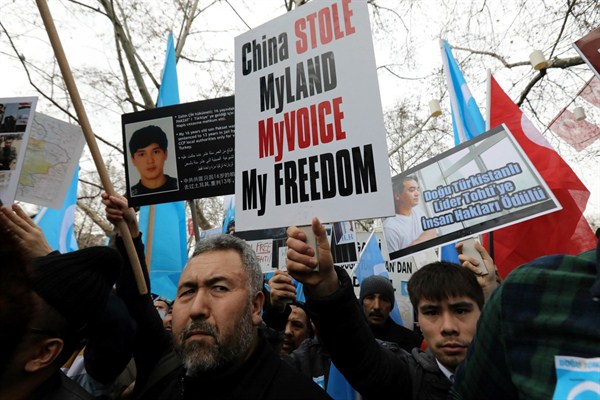Earlier this month, Turkey broke a long period of silence on China’s policy of forcibly incarcerating over 1 million Uighur Muslims, calling it a “great shame for humanity.” The statement, which prompted an indignant response from Beijing, represented a shift for Turkish President Recep Tayyip Erdogan, who has pursued deeper economic ties with China but has also come under increasing political pressure to speak out against repressive Chinese policies toward its Muslim minorities in Xinjiang, in western China. In an interview with WPR, Selçuk Çolakoglu, director of the Turkish Center for Asia-Pacific Studies in Ankara, discusses what led Erdogan’s government to finally criticize China’s treatment of the Uighurs and whether the dispute will have a lasting impact on Turkish-Chinese relations.
World Politics Review: How has China’s ongoing repression of its Muslim minorities affected the evolution of its relationship with Turkey?
Selçuk Çolakoglu: The treatment of China’s Turkic Muslim minorities has been a sensitive topic for the Turkish public, as well as for Turkish-Chinese relations, since China’s founding in 1949. The first wave of Uighur and Kazakh refugees fleeing communist oppression arrived in Turkey in the early 1950s, and they organized anti-Chinese demonstrations during the Cold War. Ever since the two countries established normal diplomatic relations in 1971, successive Turkish governments have tried to strike a delicate balance between maintaining positive ties with China, on one hand, and speaking out for the rights of Turkic Muslim communities, on the other. Some Turkish leaders hoped that Xinjiang would become a bridge between the two countries, but that never happened, partly due to Beijing’s concerns over pro-Uighur and anti-China activities in Turkey, organized by Turkish nationalist and Islamist groups. After the dissolution of the Soviet Union in the early 1990s, these groups organized public campaigns in Turkey to demand the independence of East Turkestan, as Xinjiang is commonly known in Turkish.

